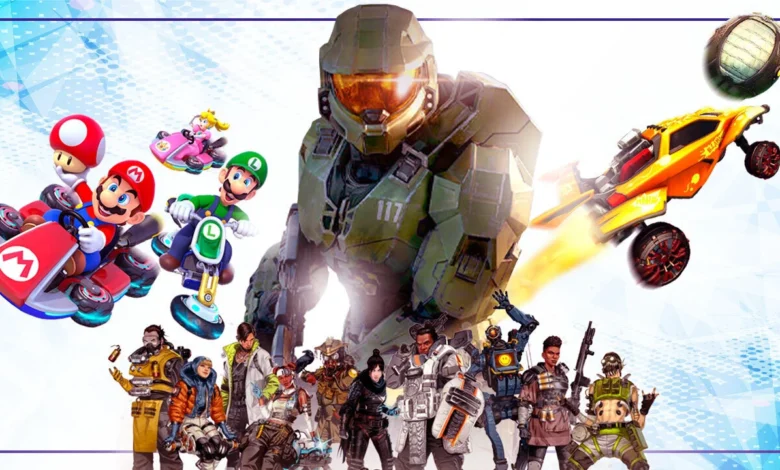
Multiplayer games have become a massive part of gaming, bringing people together from all over the world. These games provide an enjoyable and thrilling way to interact and compete, whether playing with friends or taking on others online.
But why are they so popular? Is it the social aspect, the endless variety, or the thrill of playing against real people? Below, we’ll explore what makes multiplayer games so loved by gamers everywhere and why they keep us returning for more. Let’s dive in!
Connecting Players Worldwide
Multiplayer games have revolutionized the gaming world by creating platforms where players from around the globe can connect and compete in real-time. This global connection is one of the biggest reasons for their immense popularity, transforming gaming into a shared experience that transcends borders.
Players can team up with friends, challenge strangers, or join vibrant online communities. Features like live chat and voice communication make interactions feel personal, fostering a sense of camaraderie and teamwork. Playing cooperative puzzles or planning strategies in a squad-based shooter, multiplayer games help individuals connect even if they live far away.
A great example of this global connection is found when playing the Top Live Casino Games. These games combine traditional casinos’ thrill with multiplayer gaming’s interactive nature. Players can join live sessions, interact with real dealers, and compete alongside others in a virtual yet immersive environment.
The social aspect and gameplay excitement make these games a hit among multiplayer enthusiasts.
Multiplayer games have created a worldwide gaming community by connecting people from different cultures and backgrounds. Their ability to unite players in shared experiences is what makes them an enduring favorite among gamers everywhere.
Variety of Game Modes
One of the biggest appeals of multiplayer games is the wide variety of game modes they offer. There is something for everyone, regardless of your preference for cooperative gameplay or fierce competition. This diversity keeps players engaged and ensures they can always find a mode that fits their mood or playstyle.
Competitive modes, such as ranked matches or battle royales, provide the thrill of testing your skills against others. On the other hand, cooperative modes let you team up with friends to tackle missions, solve puzzles, or achieve shared goals. Sandbox modes, custom games, and mini-games add even more layers of creativity and fun.
This variety keeps multiplayer games fresh and exciting, preventing gameplay from becoming repetitive. Players can switch between modes to explore new challenges and experiences, making multiplayer games a dynamic and enduring favorite in the gaming world.
Replayability and Evolving Challenges
Replayability is one of the core reasons why multiplayer games are so popular. Games that encourage repeated play offer players more value by maximizing enjoyment relative to the time and cost invested. This replayability is driven by captivating challenges and the ability to adapt gameplay to suit player preferences.
Multiplayer games excel by incorporating evolving challenges, such as new levels, missions, or competitive modes. These updates keep the experience fresh and engaging, encouraging players to return for more.
Importantly, replayability doesn’t rely on flashy graphics or intricate storylines—it thrives on straightforward, habit-forming gameplay that draws players back repeatedly.
Additionally, replayability fosters a sense of accomplishment as players refine their skills, face tougher opponents, or discover new strategies. This dynamic experience keeps multiplayer games relevant and exciting, making them a favorite choice for gamers who crave long-lasting entertainment.
Skill Development and Competition
Many gamers enjoy multiplayer games because they combine skill development with the thrill of competition. These games push players to improve reflexes, strategic thinking, and decision-making while engaging in real-time battles or cooperative missions. The challenge of mastering complex mechanics keeps players motivated and fosters continuous growth.
Competition is another key element driving the popularity of multiplayer games. Players aim to surpass rivals, whether playing in tournaments, rated matches, or climbing leaderboards. This competitive spirit provides a sense of accomplishment and builds resilience and determination.
Multiplayer games often introduce ranking systems and rewards, encouraging players to refine their skills and aim higher. The combination of self-improvement and the excitement of rivalry makes these games addictive and rewarding. This unique blend of challenge and achievement keeps players coming back for more.
Accessibility Across Platforms
Multiplayer games have become increasingly accessible, connecting players across platforms and ensuring inclusivity for diverse audiences. This accessibility has been a major factor in their popularity, allowing players to engage with their favorite games regardless of their device or physical abilities.
Cross-platform play ensures that gamers using consoles, PCs, or mobile devices can compete and collaborate seamlessly. Additionally, efforts to make games more inclusive for players with disabilities have opened the door for a wider audience.
Features like customizable controls, text-to-speech options, and adaptive controllers enable more people to enjoy multiplayer experiences.
For example, initiatives like Microsoft’s Xbox Adaptive Controller allow players with limited mobility to customize their setups, making gaming more inclusive and enjoyable. This universal design approach enhances accessibility while fostering community among players.
Multiplayer games have created a diverse global gaming ecosystem by embracing inclusivity and connecting people across platforms, solidifying their place as a favorite entertainment medium.
Conclusion
Multiplayer games captivate players by offering connection, variety, and competition across diverse platforms. They bring people together, challenge skills, and adapt to evolving preferences, making them more than just entertainment. These games create shared experiences and foster global communities, ensuring their lasting appeal in the ever-growing gaming world.




